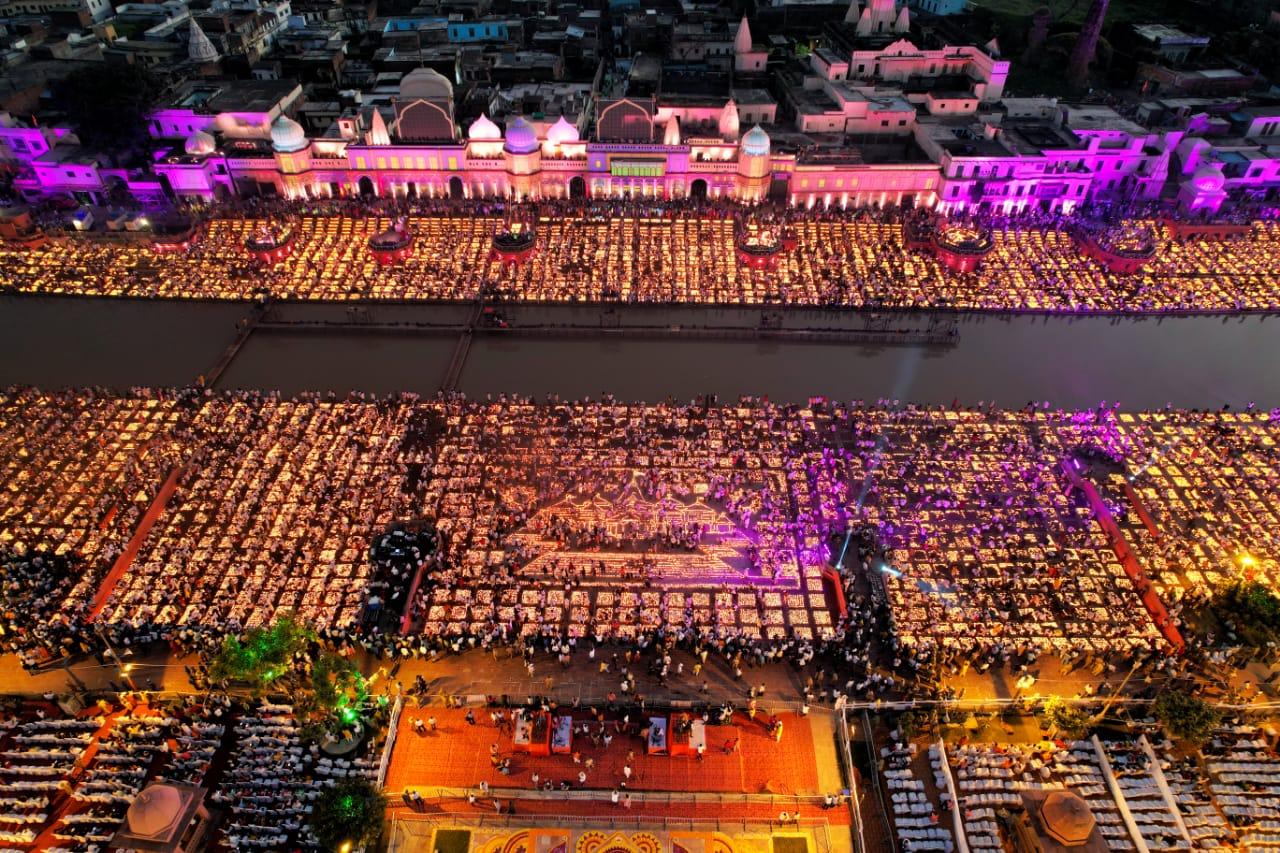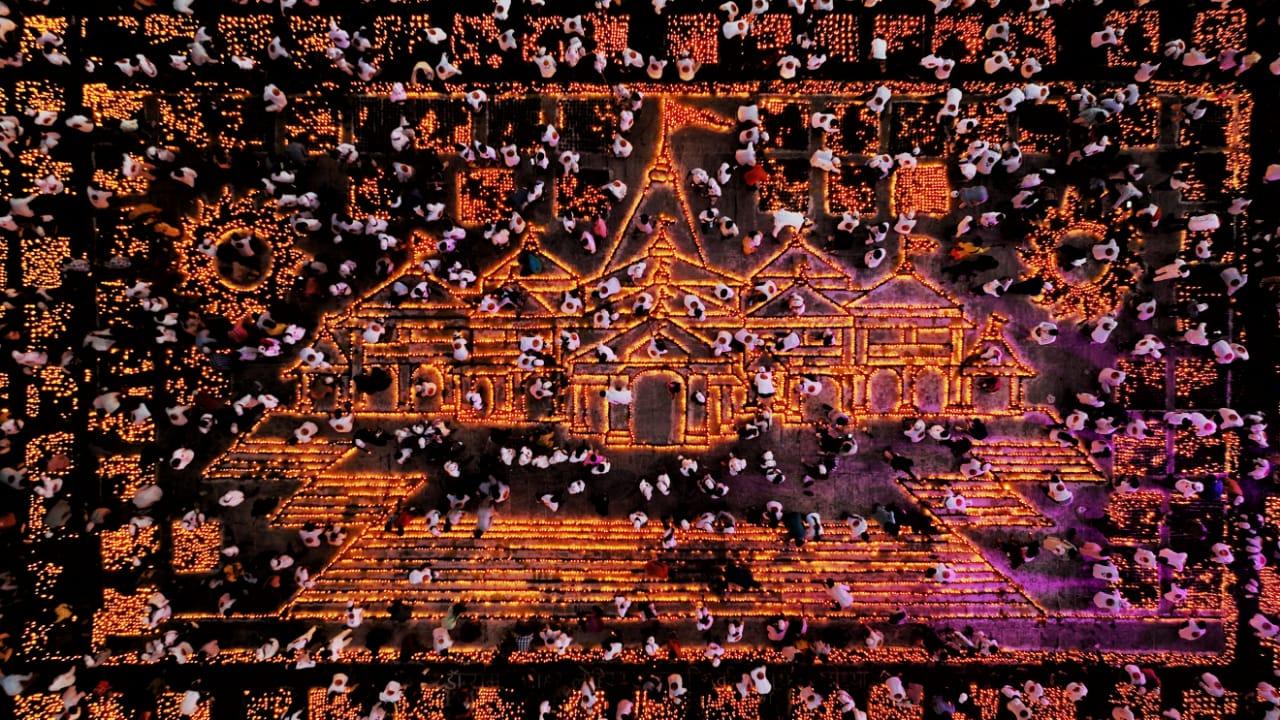Diwali Celebration 2022 in India| A Feast of JOY, SUCCESS, & PEACE
Deepavali, which in Sanskrit roughly translates as "rows of lights," is another name for Diwali. The Indian calendar's Amavasya, the darkest night of the Kartik month, marks the occasion for this festival of lights, which represents knowledge's victory over ignorance (darkness) (morning).


Several rituals, customs, & myths are tied to the Diwali celebration. A lovely message is concealed beneath every aspect of the Diwali celebrations. Gurudev Sri Sri Ravi Shankar reveals the secret significance of these long-standing Diwali traditions and practices.
Diwali, a five-day celebration, commemorates Lord Rama’s return to his home after a lengthy 14-year exile with Sita and Laxmana. Diwali, which translates literally from Sanskrit as “row of lights,” originated when the people of Ayodhya lit diyas to greet their King, Rama, after he had conquered Ravana. Additionally, some Indians think it commemorates Lord Vishnu’s marriage and Lakshmi’s marriage.
On the day of Diwali, Lord Ganesha, the god of knowledge & fortune, is worshiped in most places. In Jainism, Nirvana, or the enlightenment of Mahavira’s soul, is observed on Diwali. Diwali is recognized in West Bengal as a time to honor Kali, the goddess of Shakti, also known as power and energy.
Causes For Diwali Celebration In India
Diwali is not merely a festival honoring Lord Rama’s return to Ayodhya after killing Ravana. The following are some reasons for celebrating Diwali:
Narakaasur was defeated by Lord Krishna the day before Diwali after he invaded the three planets. Therefore, Naraka Chaturdasi is observed on the day after Diwali.
Goddess Laxmi’s birthday: Goddess Laxmi is the ‘Goddess of Wealth’ and one of the most important Hindu deities. On this particular day. Goddess Laxmi is revered for bringing wealth and prosperity.
The Pandavas’ Return: According to the Mahabharata, the Pandavas conquered the Kauravas and made their triumphant return from their 12-year exile on the day of Kartik Amavasya or Diwali.
How Is Diwali Celebrated Across India?
The entire nation of India comes together for a Diwali celebration with immense zeal and grandeur. On the evening of Diwali, people usually wear new clothes and exchange gifts, and those with the capabilities do so by purchasing silver or gold jewelry.
North India
The Deepavali festival is observed in (Himachal Pradesh, Uttarakhand, Rajasthan, Srinagar, Delhi, and Punjab) and is highlighted by fireworks, lights, and sweets. Hindu families honor the deities Lord Ganesha and Lakshmi on this day. If you are in the capital, don’t miss the Delhi Diwali Mela, where you can get food and décor for the occasion and the best Diwali celebration in India. Another top destination for Diwali travelers is Uttar Pradesh!
South India
While Andhrites and Tamilians revere Lord Krishna and his wife Satyambha’s victory over the evil King Narkasura in (Andhra Pradesh, Karnataka, and Tamil Nadu), Kannadigas take oil baths and create forts out of cow dung in their homes.
East India
Diwali celebrations in East India are primarily the night of the ancestors (West Bengal, Bihar, Jharkhand, Assam, and Odisha). In Odisha, earthen oil lamps are set on poles to direct the souls of deceased loved ones to paradise. On the eve of the Diwali festival, West Bengal and Assam people worship Goddess Kali and pray for their departed loved ones. Lakshmi pooja is performed by the residents of Bihar and Jharkhand in the evening, and women decorate their homes and temples’ verandas with rangolis. Any of these locations are good to visit to enjoy Diwali in India.
West India
Rangoli is a significant component of the Diwali celebrations in (Gujarat and Maharashtra). Maharashtrians perform Lakshmi pooja in their homes and host a feast known as “Faral” for their families and friends, where sweets like karanji and ladoo and snacks like chakli and sev are served. This contrasts with Gujaratis who draw the footprints of the goddess Laxmi on the house’s threshold and light their homes with candles, rice lights, and diyas on the night of Diwali.
You can also read https://himachal.blog/dussehra-history-and-its-significance-in-india/
The 4 Elements of Diwali and Its Relevance
1. Burning of Lamps
Diwali, well-known as the festival of lights, is a time to celebrate happiness, wealth, knowledge, and wisdom. A physical lamp is merely a representation. You are the true lamp, so you must shine brightly, joyfully, with a smile, and with all your energy because that is the true festival. And education is the only thing that can make this happen – not conveniences, technology, money, or even friends. With knowledge comes true contentment. Diwali lights represent the diffusion of knowledge.
For knowledge to advance and the darkness to vanish, many lamps must be ignited, not just one. For this reason, a lot of lamps are lit throughout Diwali. This is because our society can advance only then. Because of this, we chant “Sangachhatwam” in Sanskrit, which translates to “let us all walk together” and “may there be light and happiness in everyone’s life.” This is the special message of Diwali.
2. Fireworks
When an explosion occurs outside, it diffuses the explosion within. This is the purpose of fireworks. All the crackers should eliminate any negativity that has built up in your thoughts during the past year, such as wrath, envy, or fear. Burst all negative feelings you may have for someone with each cracker, or simply put the person’s name on the cracker and pop it, knowing that all negative emotions, such as envy, have been extinguished.
What, then, should we do? Instead of putting an end to the negative, we wish that person would be destroyed or let the negativity consume us. The order should be reversed. Consider the bad energy and vibes left with those crackers, and start being nice to that individual once more. You are packed with a sense of joy, lightness, love, peace, and happiness; share some treats with that individual as you celebrate Diwali. This is the actual spirit of Diwali. Burn the negative aspects of that individual, not them, by setting fire to crackers.
Fireworks also focus our attention on the moment. Have you ever observed that when your mind is too distracted by desires and aversions, it seems as though your brain is going to explode? The explosion outside the crackers settles something inside, making you feel lighter and more awake. Additionally, since there was no electricity back then, kids would burn fireworks to celebrate and have fun. Since we now live in an era of electricity, burning fireworks is unnecessary. Instead of utilizing firecrackers, you may light up a lot of places. Additionally, this will stop air pollution.
3.Distribution of Sweets and Gift-Exchanging
Sweets soothe anger and signify a revitalized connection. One does not necessarily need to consume a lot of fried food to celebrate Diwali. Serve others the same wholesome, nutritious meals that you consume.
4.Feeling the Abundance
It is a day to be grateful for everything we have. Wealth (Goddess Lakshmi) is believed to be ephemeral, and only appears when there is hard work, honesty, and gratitude. The Srimad Bhagavatam mentions an incident in which Goddess Lakshmi left King Bali’s body to connect with Lord Indra. When questioned, she claims that she only lives in places where there is ‘Satya’ (truth), ‘daan’ (charity), ‘vrat’ (abstinence), ‘tapa’ (penance), ‘parakram’ (courage), and ‘dharma’ (righteousness).
Let us pray and be thankful this Diwali: may there be betterment in every corner of the world, and may all individuals share love, joy, and abundance in their lives.
Diwali and its Embedded Festivities
Diwali celebrations begin on the fortnight’s 13th day of the waning moon and last for five days.
Dhanteras
Businesses and residences are renovated and embellished on Dhanteras or Dhantrayodashi, the first day of the celebrations. The entrances are colorfully decorated with lovely, traditional rangoli patterns to welcome the goddess of wealth and prosperity (Lakshmi). Small footprints are drawn all over the house with rice flour and vermilion powder to mark her long-awaited arrival. Throughout the night, lamps are kept lit. Women buy gold, silver, or new utensils on this auspicious day. Cattle are also worshiped in some parts of India.
This day is also celebrated as Dhanvantari Jayanti, the birthday of Dhanvantari, the god of Ayurveda or the physician of gods. On this day, lamps are lit all night in honor of Lord Yama, the god of death, and thus known as ‘Yamadeepdaan.’ This is intended to alleviate the fear of dying prematurely.
Naraka Chaturdashi
On the second day, Naraka Chaturdashi, it is customary to rise early and take a bath before sunrise. According to legend, the demon king Narakasur, ruler of Pragjyotishpur (a province in southern Nepal), defeated Lord Indra, stole Aditi’s (the mother goddess’) magnificent earrings, and imprisoned sixteen thousand daughters of the gods & saints in his harem. On the day before Naraka Chaturdashi, Lord Krishna killed the demon, exiled the imprisoned damsels, and retrieved Aditi’s precious earrings. The womenfolk massaged the scented oil into his skin and bathed him to remove the filth. As a result, the early morning bathing ritual represents the Divine’s victory over negative elements. This day heralds the beginning of a brighter future.
Lakshmi Puja
The third day of the celebrations is the most important – Lakshmi Puja. Today marks the beginning of the sun’s second course. Despite having the darkest night, this day is considered very auspicious. The night’s impenetrable darkness fades as small twinkling lamps illuminate entire cities. On this night, Goddess Lakshmi is said to grace the earth and shower us with blessings of abundance and prosperity. People perform Lakshmi Puja in the evening and distribute homemade sweets to everyone.
The Diwali festival strongly connects to our ancient epics and scriptures, such as the Ramayana and Mahabharata. Many events in the Mahabharata and Puranas are linked to the Diwali festival. For example, when Lord Rama returned to Ayodhya after a 14-year exile, the entire city celebrated by lighting lamps everywhere.
Govardhan Puja
Varshapratipada commemorates King Vikram’s coronation on the fourth day of the festivities. This was also the day when Lord Krishna lifted Govardhan, the magnificent mountain, to save the people of Gokul from the torrential rains brought on by Lord Indra’s rage.
Bhai Dooj
Bhai Dooj commemorates the love between brothers and sisters, or the fifth day. As a token of their affection, the brothers give their sisters a gift.
The Core of Diwali
Remember the comprehensiveness and eternity of your life this Diwali, and feel a deep feeling of thankfulness for everything you have been given. Remind yourself that you are also a magnificent lamp to spread the light of happiness and knowledge as you light lamps and spread light everywhere. Everyone who comes to you should be filled with delight and not experience any sadness. You ought to pray for this.













